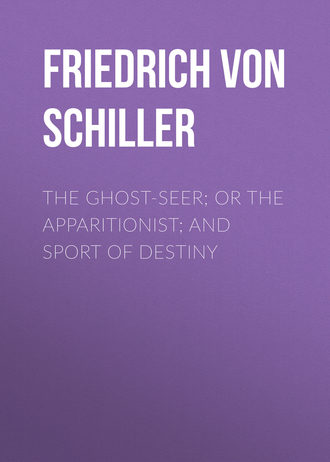
Фридрих Шиллер
The Ghost-Seer; or the Apparitionist; and Sport of Destiny
LETTER VI.
BARON F – TO COUNT O – . June 20
This Civitella is certainly one of the most obliging personages in the world. The prince had scarcely left me the other day before I received a note from the marquis enforcing his former offers with renewed earnestness. I instantly forwarded, in the prince’s name, a bond for six thousand zechins; in less than half an hour it was returned, with double the sum required, in notes and gold. The prince at length assented to this increase, but insisted that the bond, which was drawn only for six weeks, should be accepted.
The whole of the present week has been consumed in inquiries after the mysterious Greek. Biondello set all his engines to work, but until now in vain. He certainly discovered the gondolier; but from him he could learn nothing, save that the ladies had disembarked on the island of Murano, where they entered two sedan chairs which were waiting for them. He supposed them to be English because they spoke a foreign language, and had paid him in gold. He did not even know their guide, but believed him to be a glass manufacturer from Murano. We were now, at least, certain that we must not look for her in the Giudecca, and that in all probability she lived in the island of Murano; but, unluckily, the description the prince gave of her was not such as to make her recognizable by a third party. The passionate interest with which he had regarded her had hindered him from observing her minutely; for all the minor details, which other people would not have failed to notice, had escaped his observation; from his description one would have sooner expected to find her prototype in the works of Ariosto or Tasso than on a Venetian island. Besides, our inquiries had to be conducted with the utmost caution, in order not to become prejudicial to the lady, or to excite undue attention. As Biondello was the only man besides the prince who had seen her, even through her veil, and could therefore recognize her, he strove to be as much as possible in all the places where she was likely to appear; the life of the poor man, during the whole week, was a continual race through all the streets of Venice. In the Greek church, particularly, every inquiry was made, but always with the same ill-success; and the prince, whose impatience increased with every successive failure, was at last obliged to wait till Saturday, with what patience he might. His restlessness was excessive. Nothing interested him, nothing could fix his attention. He was in constant feverish excitement; he fled from society, but the evil increased in solitude. He had never been so much besieged by visitors as in this week. His approaching departure had been announced, and everybody crowded to see him. It was necessary to occupy the attention of the people in order to lull their suspicions, and to amuse the prince with the view of diverting his mind from its all-engrossing object. In this emergency Civitella hit upon play; and, for the purpose of driving away most of the visitors, proposed that the stakes should be high. He hoped by awakening in the prince a transient liking for play, from which it would afterwards be easy to wean him, to destroy the romantic bent of his passion. “The cards,” said Civitella, “have saved me from many a folly which I had intended to commit, and repaired many which I had already perpetrated. At the faro table I have often recovered my tranquillity of mind, of which a pair of bright eyes had robbed me, and women never had more power over me than when I had not money enough to play.”
I will not enter into a discussion as to how far Civitella was right; but the remedy we had hit upon soon began to be worse than the disease it was intended to cure. The prince, who could only make the game at all interesting to himself by staking extremely high, soon overstepped all bounds. He was quite out of his element. Everything he did seemed to be done in a passion; all his actions betrayed the uneasiness of his mind. You know his general indifference to money; he seemed now to have become totally insensible to its value. Gold flowed through his hands like water. As he played without the slightest caution he lost almost invariably. He lost immense sums, for he staked like a desperate gamester. Dearest O – , with an aching heart I write it, in four days he had lost above twelve thousand zechins.
Do not reproach me. I blame myself sufficiently. But how could I prevent it? Could I do more than warn him? I did all that was in my power, and cannot find myself guilty. Civitella, too, lost not a little; I won about six hundred zechins. The unprecedented ill-luck of the prince excited general attention, and therefore he would not leave off playing. Civitella, who is always ready to oblige him, immediately advanced him the required sum. The deficit is made up; but the prince owes the marquis twenty-four thousand zechins. Oh, how I long for the savings of his pious sister. Are all sovereigns so, my dear friend? The prince behaves as though he had done the marquis a great honor, and he, at any rate, plays his part well.
Civitella sought to quiet me by saying that this recklessness, this extraordinary ill-luck, would be most effectual in bringing the prince to his senses. The money, he said, was of no consequence. He himself would not feel the loss in the least, and would be happy to serve the prince, at any moment, with three times the amount. The cardinal also assured me that his nephew’s intentions were honest, and that he should be ready to assist him in carrying them out.
The most unfortunate thing was that these tremendous sacrifices did not even effect their object. One would have thought that the prince would at least feel some interest in his play. But such was not the case. His thoughts were wandering far away, and the passion which we wished to stifle by his ill-luck in play seemed, on the contrary, only to gather strength. When, for instance, a decisive stroke was about to be played, and every one’s eyes were fixed, full of expectation, on the board, his were searching for Biondello, in order to catch the news he might have brought him, from the expression of his countenance. Biondello brought no tidings, and his master’s losses continued.
The gains, however, fell into very needy hands. A few “your excellencies,” whom scandal reports to be in the habit of carrying home their frugal dinner from the market in their senatorial caps, entered our house as beggars, and left it with well-lined purses. Civitella pointed them out to me. “Look,” said he, “how many poor devils make their fortunes by one great man taking a whim into his head. This is what I like to see. It is princely and royal. A great man must, even by his failings, make some one happy, like a river which by its overflowing fertilizes the neighboring fields.”
Civitella has a noble and generous way of thinking, but the prince owes him twenty-four thousand zechins.
At length the long-wished-for Saturday arrived, and my master insisted upon going, directly after dinner, to the church. He stationed himself in the chapel where he had first seen the unknown, but in such a way as not to be immediately observed. Biondello had orders to keep watch at the church door, and to enter into conversation with the attendant of the ladies. I had taken upon myself to enter, like a chance passenger, into the same gondola with them on their return, in order to follow their track if the other schemes should fail. At the spot where the gondolier said he had landed them the last time two sedans were stationed; the chamberlain, Z – , was ordered to follow in a separate gondola, in order to trace the retreat of the unknown, if all else should fail. The prince wished to give himself wholly up to the pleasure of seeing her, and, if possible, try to make her acquaintance in the church. Civitella was to keep out of the way altogether, as his reputation among the women of Venice was so bad that his presence could not have failed to excite the suspicions of the lady. You see, dear count, it was not through any want of precaution on our part that the fair unknown escaped us.
Never, perhaps, was there offered up in any church such ardent prayers for success, and never were hopes so cruelly disappointed. The prince waited till after sunset, starting in expectation at every sound which approached the chapel, and at every creaking of the church door. Seven full hours passed, and no Greek lady. I need not describe his state of mind. You know what hope deferred is, hope which one has nourished unceasingly for seven days and nights.
LETTER VII.
BARON VON F – TO COUNT VON O – July
The mysterious unknown of the prince reminded Marquis Civitella of a romantic incident which happened to himself a short time since, and, to divert the prince, he offered to relate it. I will give it you in his own words; but the lively spirit which he infuses into all he tells will be lost in my narration.
(Here follows the subjoined fragment, which appeared in the eighth part of the Thalia, and was originally intended for the second volume of the Ghost-Seer. It found a place here after Schiller had given up the idea of completing the Ghost-Seer.)
“In the spring of last year,” began Civitella, “I had the misfortune to embroil myself with the Spanish ambassador, a gentleman who, in his seventieth year, had been guilty of the folly of wishing to marry a Roman girl of eighteen. His vengeance pursued me, and my friends advised me to secure my safety by a timely flight, and to keep out of the way until the hand of nature, or an adjustment of differences, had secured me from the wrath of this formidable enemy. As I felt it too severe a punishment to quit Venice altogether, I took up my abode in a distant quarter of the town, where I lived in a lonely house, under a feigned name, keeping myself concealed by day, and devoting the night to the society of my friends and of pleasure.
“My windows looked upon a garden, the west side of which was bounded by the walls of a convent, while towards the east it jutted out into the Laguna in the form of a little peninsula. The garden was charmingly situated, but little frequented. It was my custom every morning, after my friends had left me, to spend a few moments at the window before retiring to rest, to see the sun rise over the Adriatic, and then to bid him goodnight. If you, my dear prince, have not yet enjoyed this pleasure, I recommend exactly this station, the only eligible one perhaps in all Venice to enjoy so splendid a prospect in perfection. A purple twilight hangs over the deep, and a golden mist on the Laguna announces the sun’s approach. The heavens and the sea are wrapped in expectant silence. In two seconds the orb of day appears, casting a flood of fiery light on the waves. It is an enchanting sight.
“One morning, when I was, according to custom, enjoying the beauty of this prospect, I suddenly discovered that I was not the only spectator of the scene. I fancied I heard voices in the garden, and turning to the quarter whence the sound proceeded, I perceived a gondola steering for the land. In a few moments I saw figures walking at a slow pace up the avenue. They were a man and a woman, accompanied by a little negro. The female was clothed in white, and had a brilliant on her finger. It was not light enough to perceive more.
“My curiosity was raised. Doubtless a rendezvous of a pair of lovers – but in such a place, and at so unusual an hour! It was scarcely three o’clock, and everything was still veiled in dusky twilight. The incident seemed to me novel and proper for a romance, and I waited to see the end.
“I soon lost sight of them among the foliage of the garden, and some time elapsed before they again emerged to view. Meanwhile a delightful song was heard. It proceeded from the gondolier, who was in this manner shortening the time, and was answered by a comrade a short way off. They sang stanzas from Tasso; time and place were in unison, and the melody sounded sweetly, in the profound silence around.
“Day in the meantime had dawned, and objects were discerned more plainly. I sought my people, whom I found walking hand-in-hand up a broad walk, often standing still, but always with their backs turned towards me, and proceeding further from my residence. Their noble, easy carriage convinced me at once that they were people of rank, and the splendid figure of the lady made me augur as much of her beauty. They appeared to converse but little; the lady, however, more than her companion. In the spectacle of the rising sun, which now burst out in all its splendor, they seemed to take not the slightest interest.
“While I was employed in adjusting my glass, in order to bring them into view as closely as possible, they suddenly disappeared down a side path, and some time elapsed before I regained sight of them. The sun had now fully risen; they were approaching straight towards me, with their eyes fixed upon where I stood. What a heavenly form did I behold! Was it illusion, or the magic effect of the beautiful light? I thought I beheld a supernatural being, for my eyes quailed before the angelic brightness of her look. So much loveliness combined with so much dignity! – so much mind, and so much blooming youth! It is in vain I attempt to describe it. I had never seen true beauty till that moment.
“In the heat of conversation they lingered near me, and I had full opportunity to contemplate her. Scarcely, however, had I cast my eyes upon her companion, but even her beauty was not powerful enough to fix my attention. He appeared to be a man still in the prime of life, rather slight, and of a tall, noble figure. Never have I beheld so much mind, so much noble expression, in a human countenance. Though perfectly secured from observation, I was unable to meet the lightning glance that shot from beneath his dark eyebrows. There was a moving expression of sorrow about his eyes, but an expression of benevolence about the mouth which relieved the settled gravity spread over his whole countenance. A certain cast of features, not quite European, together with his dress, which appeared to have been chosen with inimitable good taste from the most varied costumes, gave him a peculiar air, which not a little heightened the impression produced by his appearance. A degree of wildness in his looks warranted the supposition that he was an enthusiast, but his deportment and carriage showed that his character had been formed by mixing in society.”
Z – , who you know must always give utterance to what he thinks, could contain himself no longer. “Our Armenian!” cried he. “Our very Armenian, and nobody else.”
“What Armenian, if one may ask?” inquired Civitella.
“Has no one told you of the farce?” replied the prince. “But no interruption! I begin to feel interested in your hero. Pray continue your narrative.”
“There was something inexplicable in his whole demeanor,” continued Civitella. “His eyes were fixed upon his companion with an expression of anxiety and passion, but the moment they met hers he looked down abashed. ‘Is the man beside himself!’ thought I. I could stand for ages and gaze at nothing else but her.
“The foliage again concealed them from my sight. Long, long did I look for their reappearance, but in vain. At length I caught sight of them from another window.
“They were standing before the basin of a fountain at some distance apart, and both wrapped in deep silence. They had, probably, remained some time in the same position. Her clear and intelligent eyes were resting inquiringly on his, and seemed as if they would imbibe every thought from him as it revealed itself in his countenance. He, as if he wanted courage to look directly into her face, furtively sought its reflection in the watery mirror before him, or gazed steadfastly at the dolphin which bore the water to the basin. Who knows how long this silent scene might have continued could the lady have endured it? With the most bewitching grace the lovely girl advanced towards him, and passing her arm round his neck, raised his hand to her lips. Calmly and unmoved the strange being suffered her caresses, but did not return them.
“This scene moved me strangely. It was the man that chiefly excited my sympathy and interest. Some violent emotion seemed to struggle in his breast; it was as if some irresistible force drew him towards her, while an unseen arm held him back. Silent, but agonizing, was the struggle, and beautiful the temptation. ‘No,’ I thought, ‘he attempts too much; he will, he must yield.’
“At his silent intimation the young negro disappeared. I now expected some touching scene – a prayer on bended knees, and a reconciliation sealed with glowing kisses. But no! nothing of the kind occurred. The incomprehensible being took from his pocketbook a sealed packet, and placed it in the hands of the lady. Sadness overcast her face as she she looked at it, and a tear bedewed her eye.
“After a short silence they separated. At this moment an elderly lady advanced from one of the sidewalks, who had remained at a distance, and whom I now first discovered. She and the fair girl slowly advanced along the path, and, while they were earnestly engaged in conversation, the stranger took the opportunity of remaining behind. With his eyes turned towards her, he stood irresolute, at one instant making a rapid step forward, and in the next retreating. In another moment he had disappeared in the copse.
“The women at length look round, seem uneasy at not finding him, and pause as if to await his coming. He comes not. Anxious glances are cast around, and steps are redoubled. My eyes aid in searching through the garden; he comes not, he is nowhere to be seen.
“Suddenly I see a plash in the canal, and see a gondola moving from the shore. It is he, and I scarcely can refrain from calling to him. Now the whole thing is clear – it was a parting.
“She appears to have a presentiment of what has happened. With a speed that her companion cannot use she hastens to the shore. Too late! Quick as the arrow in its flight the gondola bounds forward, and soon nothing is visible but a white handkerchief fluttering in the air from afar. Soon after this I saw the fair incognita and her companion cross the water.
“When I awoke from a short sleep I could not help smiling at my delusion. My fancy had incorporated these events in my dreams until truth itself seemed a dream. A maiden, fair as an houri, wandering beneath my windows at break of day with her lover – and a lover who did not know how to make a better use of such an hour. Surely these supplied materials for the composition of a picture which might well occupy the fancy of a dreamer! But the dream had been too lovely for me not to desire its renewal again and again; nay, even the garden had become more charming in my sight since my imagination had peopled it with such attractive forms. Several cheerless days that succeeded this eventful morning drove me from the window, but the first fine evening involuntarily drew me back to my post of observation. Judge of my surprise when after a short search I caught sight of the white dress of my incognita! Yes, it was she herself. I had not dreamed!
“Her former companion was with her, and led by the hand a little boy; but the fair girl herself walked apart, and seemed absorbed in thought. All spots were visited that had been rendered memorable by the presence of her friend. She paused for a long time before the basin, and her fixed gaze seemed to seek on its crystal mirror the reflection of one beloved form.
“Although her noble beauty had attracted me when I first saw her the impression produced was even stronger on this occasion, although perhaps at the same time more conducive to gentler emotions. I had now ample opportunity of considering this divine form; the surprise of the first impression gradually gave place to softer feelings. The glory that seemed to invest her had departed, and I saw before me the loveliest of women, and felt my senses inflamed. In a moment the resolution was formed that she must be mine.
“While I was deliberating whether I should descend and approach her, or whether before I ventured on such a step it would not be better to obtain information regarding her, a door opened in the convent wall, through which there advanced a Carmelite monk. The sound of his approach roused the lady, and I saw her advance with hurried steps towards him. He drew from his bosom a paper, which she eagerly grasped, while a vivid color instantaneously suffused her countenance.
“At this moment I was called from the window by the arrival of my usual evening visitor. I carefully avoided approaching the spot again as I had no desire to share my conquest with another. For a whole hour I was obliged to endure this painful constraint before I could succeed in freeing myself from my importunate guest, and when I hastened to the window all had disappeared.
“The garden was empty when I entered it; no vessel of any kind was visible in the canal; no trace of people on any side; I neither knew whence she had come nor whither she bad gone. While I was looking round me in all directions I observed something white upon the ground. On drawing near I found it was a piece of paper folded in the shape of a note. What could it be but the letter which the Carmelite had brought? ‘Happy discovery!’ I exclaimed; ‘this will reveal the whole secret, and make me master of her fate.’
“The letter was sealed with a sphinx, had no superscription, and was written in cyphers; this, however, did not discourage me, for I have some knowledge of this mode of writing. I copied it hastily, as there was every reason to expect that she would soon miss it and return in search of it. If she should not find it she would regard its loss as an evidence that the garden was resorted to by different persons, and such a discovery might easily deter her from visiting it again. And what worse fortune could attend my hopes.
“That which I had conjectured actually took place, and I had scarcely ended my copy when she reappeared with her former companion, anxiously intent on the search. I attached the note to a tile which I had detached from the roof, and dropped it at a spot which she would pass. Her gracefully expressed joy at finding it rewarded me for my generosity. She examined it in every part with keen, searching glances, as if she were seeking to detect the unhallowed hands that might have touched it; but the contented look with which she hid it in her bosom showed that she was free from all suspicion. She went, and the parting glance she threw on the garden seemed expressive of gratitude to the guardian deities of the spot, who had so faithfully watched over the secret of her heart.
“I now hastened to decipher the letter. After trying several languages, I at length succeeded by the use of English. Its contents were so remarkable that my memory still retains a perfect recollection of them.”
I am interrupted, and must give you the conclusion on a future occasion.







